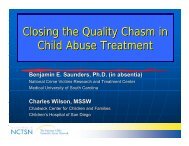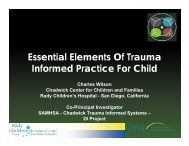Kauffman Best Practices Project Final Report - The Chadwick Center ...
Kauffman Best Practices Project Final Report - The Chadwick Center ...
Kauffman Best Practices Project Final Report - The Chadwick Center ...
Create successful ePaper yourself
Turn your PDF publications into a flip-book with our unique Google optimized e-Paper software.
defiant disorder, adjustment disorder with disturbance of conduct, or show<br />
similar but sub-clinical or atypical behavior problems not meeting full<br />
diagnostic criteria. Reductions in child behavior problems related to PCIT<br />
have been found to be robust and durable over time, and generalizable from<br />
home to school environments. Benefits also appear to generalize to untreated<br />
children in the same family, and include improvements in the quality of<br />
parent-child relationships. PCIT as a child treatment may be conducted with<br />
parents, foster parents or others in a parental role. Benefits have been found<br />
to be stable across genders and a variety of ethnic groups.<br />
PCIT may also be useful for behavior problems associated with Attention<br />
Deficit Hyperactivity Disorder (ADHD). However, treatment for children with<br />
behavior problems involving ADHD should also be evaluated for specific<br />
concurrent ADHD interventions, such as stimulant medication.<br />
As a treatment for physically abusive parents, PCIT has also been found to be<br />
efficacious for parents with children ages 4 - 12 where physical abuse occurred<br />
within the context of child discipline, which is the most common context for<br />
physical abuse. Efficacy as a parent treatment has been found among multiproblem<br />
parents with significant past child welfare report histories, and PCIT<br />
appears to be fairly sufficient as a parent treatment, in that efficacy does<br />
not appear to be enhanced by the addition of supplemental services such as<br />
individual or family counseling. Benefits have been found to be stable across<br />
parent gender and ethnic groups.<br />
Contraindications<br />
WHILE PCIT IS VERY EFFECTIVE IN ADDRESSING CERTAIN TYPES OF PROBLEMS,<br />
THERE ARE CLEAR LIMITATIONS IN ITS USE. THESE INCLUDE:<br />
• Parents and children need to have consistent ongoing contact in order to be<br />
able to effectively change parent-child patterns of interaction. PCIT is not<br />
appropriate for families in which the parent and child have very limited<br />
(i.e., one hour weekly visitation) or no ongoing contact.<br />
• <strong>The</strong>re is no research to support the use of PCIT with very young children<br />
(less than two and a half years of age) and only limited research with older<br />
age children (older than eight years of age). <strong>The</strong>re is no research to support<br />
the use of PCIT with adolescents.<br />
• PCIT is not appropriate for parents with mental health problems that may<br />
include auditory/visual hallucinations and/or delusions.<br />
• Due to the process of ‘coaching’ parents, it is difficult to conduct PCIT<br />
with parent/child who are hearing impaired and/or who have significant<br />
expressive or receptive language skills.<br />
PCIT has also not been evaluated with sexually abusive parents, parents<br />
engaging in sadistic physical child abuse, or seriously mentally ill parents. At<br />
this point, it is contraindicated with these groups. In fact, given the underlying<br />
dynamic of parental control and misuse of power over the child, teaching the<br />
abusive parent better means of control over the child may be harmful.<br />
16






